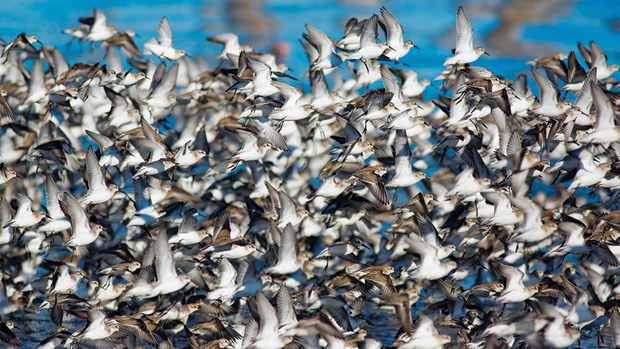If it’s not a death blow, it’s going to be extremely difficult for the Port of Vancouver to counter.
That’s how Against Port Expansion’s Roger Emsley described the apparent rebuke by Environment and Climate Change Canada of the port authority’s proposed Terminal 2 expansion.
In a recent submission to a federal review panel gathering input on the application to build a second container terminal at Roberts Bank, the federal agency outlined a number of serious concerns regarding the impact to bird populations and disagreed with the port’s conclusion the project, with the implementation of proposed mitigation measures, would result in no residual effects to coastal birds other than for diving birds.
The agency also outlined concerns with the proposed offset plan to mitigate the direct loss of wetlands, including mudflats, noting most of the reliable evidence in the port’s environmental impact statement indicated the potential for large declines in food availability for shorebirds during the critical breeding migration period.
“ECCC maintains that there is insufficient, science-based information to support the proponent’s finding that the project would not adversely impact intertidal biofilm and consequently, migratory shorebirds in general, and the western sandpiper species in particular,” the submission states.
Emsley said T2’s potentially devastating consequences for the ecosystem, already raised by scientists, have been highlighted by the federal agency.
“Remember that ultimately it is the minister of environment that has to determine if there are significant impacts that cannot be mitigated. Her own department has told her very clearly there are impacts and they cannot be mitigated,” he said, calling the agency’s submission a “damning response.”
Biofilm is a thin dense layer of microscopic photosynthetic algae and bacteria that is an important source of food for western sandpipers and other shorebirds during migration.
The port’s environmental impact statement states its assessment determined the “project is expected to temporarily influence community composition of biofilm during freshet from terminal footprint-related changes in salinity, but is expected to return to existing conditions outside of the annual freshet period.”
The port added the assessment concluded there are no significant adverse residual effects from the project to marine vegetation.
In a statement, Cliff Stewart, the port’s vice-president of infrastructure, said, “We welcome these important conversations with agencies and others and look forward, through the panel review process, to work together on the items that have been raised.
"We are confident in the conclusions of the many years of scientific study done for the Roberts Bank Terminal 2 Project. We also have full confidence in the independent federal panel process to assess that science and make its recommendation.”
During Delta council’s discussion this week on the city’s new Birds and Biodiversity Conservation Strategy it was noted T2 would be located in an area close to the critical mudflats.
In a previous submission to the panel, the city warned if there is continued lack of consensus following the panel review process about the potential effects of the project on the environment, the panel is urged to err on the side of caution and recommend that application be denied.
The city’s position also states that T2 should at least be postponed until there is greater consensus between scientific, regulatory and environmental agencies.



